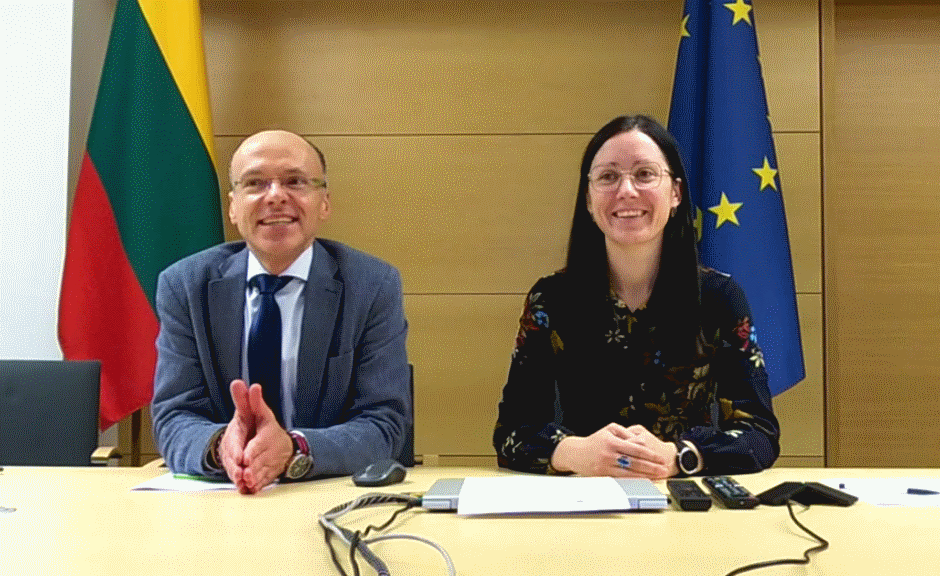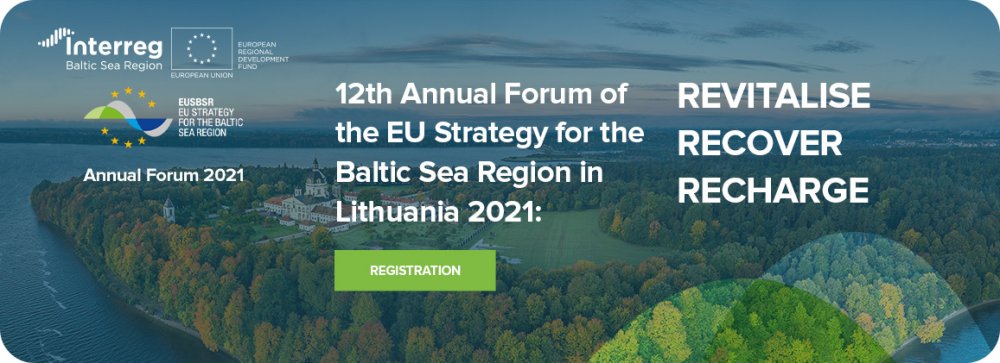News
- Details
Already next week, the 12th Annual Forum of the EU Strategy for the Baltic Sea Region will take place from 27 September to 1 October 2021 online. This year, the event is organised by the Lithuanian presidency and will invite participants to REVITALISE, RECOVER and RECHARGE. The ‘Let’s Communicate!’ project team took a chance to meet the organisers and have a short glimpse into the event organisation and the highlights of the upcoming Forum. We met the organisers from the Ministry of Foreign Affairs of Lithuania – Mr Robertas Bružilas, Chair of the EUSBSR National Coordinator’s Group, and Ms Laura Čeponytė, Counsellor at the European Union Department.
Screenshot from the interview: representatives from the Ministry of Foreign Affairs of Lithuania Mr Robertas Bružilas, EUSBSR National Coordinator, and Ms Laura Čeponytė, Counsellor.
The main theme of the Annual Forum is green recovery. Why was this topic chosen?
Why green recovery? The current situation encouraged us to choose this topic. It is very important, and it will remain so for the next decades. We wanted to see how macro-regional strategies could contribute to green recovery and transition, using the good elements that macro-regional strategies have – multi-level governance, thematic projects, experience of cross border cooperation etc. These elements are crucial when facing the challenges of green transformation, as no country can tackle them alone. There is a great window of opportunity for the EU macro-regional strategies to increase their role, and all countries should utilise this framework for successful recovery through green, digital, resilient, and inclusive transformation.
What are the guiding principles that build the agenda of the Annual Forum?
Three words characterise the EUSBSR Annual Forum 2021 – REVITALISE political attention, RECOVER after the pandemic, and RECHARGE – an invitation for current stakeholders as well as newcomers to come up with new ideas and financial resources, and to use new momentum.
Another guiding principle during the Annual Forum is the idea of synergies. Therefore, we have tried to bring in different players. We, as the organisers, are cooperating with the European Commission, central governments and regional authorities, counties and municipalities, regional organisations, and different projects. We are building synergies between central governments, regions, and cities, between youth and seniors, between countries around the region, between topics like energy and climate, green and blue economy, as well as between different policy areas. All possible synergies and all these topics are being covered in the Annual Forum.
The Annual Forum is based on two more factors. The first one is that the city of Kaunas will be the European Capital of Culture 2022, which is why we pay particular attention to culture and invite the audience to visit virtual museums and galleries. Second, the city of Klaipeda is the European Youth Capital 2021. The Annual Forum will invite youth representatives to join all plenaries and hand-over the full ownership of the last day of the Forum to the youth.
We also invited Kaunas and Klaipeda cities, as well as the Union of the Baltic Cities (UBC) to become our partners in organising the Annual Forum, to emphasise the role of the cities, culture, and youth in the Baltic Sea Region.
What are some of the highlights that will be intriguing for the participants during the Annual Forum?
Never before has the Annual Forum been organised for 5 consecutive days. Furthermore, the Forum is for the second time organised online, giving participants an opportunity to explore a wide range of EUSBSR related topics live from home. A user-friendly platform will ensure an easy access to plenaries, workshops, and back-to-back events. All discussions will be live, engaging participants and speakers to interact by posing questions in the chat.
The importance cities will play during this year’s Annual Forum is another highlight. The regional level and municipalities are what really counts. Regional cooperation is important within the EUSBSR and we hope that different regional cooperation opportunities will emerge during the discussions.
Throughout the event, five major plenary sessions will be organised daily 13:00 – 14:30 (CET) with high-level keynote speakers. The speakers are announced in the social media channels of the EUSBSR (Twitter and Facebook) during the week before the Forum.
27 SEPTEMBER: OPENING PLENARY
The opening session on 27 September is a high-level event aiming to revitalise the political attention to the strategy. This is the 12th Forum, we are in the second decade of the implementation of the strategy, and we see that the political attention needs to awaken. This event will take place in a hybrid format - online and in Kaunas city.
28 SEPTEMBER: ROLE OF THE EU MACRO-REGIONAL STRATEGIES
On 28 September there will be a broader discussion on the role of macro-regional strategies in setting the EU agenda. The session will gather speakers from the EU strategies for the Baltic Sea Region, the Danube Region, the Adriatic and Ionian Region, and the Alpine Region, to enable the cross-strategy link and share lessons learnt and best practices from other strategies.
29 SEPTEMBER: CHALLENGES AND OPPORTUNITIES FOR YOUTH
The plenary session on 29 September will focus on the social dimension and the challenges the youth encounter due to the COVID-19 pandemic. The participants will search for ways multilateral cooperation could contribute to enabling young people to participate more actively in decision-making processes.
30 SEPTEMBER: GREEN RECOVERY
The session on 30 September is dedicated to green recovery and its regional dimension, particularly, the role of education, skills development, and inclusiveness in strengthening green transformation and ensuring involvement and ownership of societies and businesses.
1 OCTOBER: SUSTAINABLE FUTURE OF THE BSR - ROLE OF THE YOUTH
The Forum will be closed by the youth plenary on 1 October. The whole last day is dedicated to youth participation in decision making and to showcasing how they can benefit from and contribute to the strategy. The event will be hosted from Klaipeda city in a hybrid format.
INTERREG BALTIC SEA REGION PROGRAMME KICK-OFF
Another important meeting will be hosted on 28 September – the kick-off event of the Interreg Baltic Sea Region Programme for the period 2021-2027. It will set a new financial perspective for the upcoming seven years. It will also introduce new opportunities for stakeholders, countries, and participants to shape an environment for working together across borders in the Baltic Sea Region.
How many participants do you expect to join?
We expect to attract the EUSBSR stakeholders and especially the newcomers to the strategy to join and to look for partnerships, as well as to engage and get new ideas on how green and digital transformation can help in the post pandemic era. In total around 40 different events will be hosted during these 5 days and more than 1000 participants have already registered.
What topics will be discussed in the workshops and how can participants join them?
There are 14 Policy Areas in the EUSBSR and nearly all of them will be presented in the workshops and side events. Another 15 workshops will be organised by different stakeholders – universities, regional organisations, unions, and other initiatives. All 30 workshop topics are in line with Forum’s concept, representing green goals and the involvement of youth, local authorities, and communities. Workshop topics include the role of culture in green transformation, energy efficiency, biodiversity, the role of cities, green entrepreneurship, citizens’ engagement in green transition etc. Workshops create an engaging content for every participant to find relevant topics and get additional know-how.
Workshop descriptions are published on the website www.eusbsr2021.eu. During the registration participants can select the sessions of interest.
Networking has always been an important part of the Annual Forum. How will participants be able to join the networking part and what can they expect from it?
Networking is a key feature that brings participants together and engages stakeholders to present their activities within the EUSBSR and newcomers to ask questions and explore the work done within the strategy. This year, three networking villages will be organised, each with their own approach:
- The networking on 28 September will be dedicated to the EUSBSR as such to help newcomers, participants, and organisations to understand what the strategy is about.
- The second session on 29 September will focus on the partnerships that could be created within the strategy and encourage stakeholders to meet, discuss, consult, and cooperate.
- The third networking session on 30 September will foster green innovations by providing a platform for researchers and entrepreneurs to present their innovations and find partners.
Networking villages will be moderated to ensure engagement from the participants who want to network and look for partners. For bilateral or multilateral meetings there will be the possibility of break out rooms for discussion with new partners.
In addition to these networking villages there will also be other possibilities for creating partnerships. We will pay special attention to the cities and their role in the region. On 29 and 30 September, respectively, two separate platforms will be open for cities from around the Baltic Sea to present themselves and to look for partners. The first platform, on 29 September, will present the cities’ role in positive social transformations, while the second, on the following day, will showcase cities’ strategic projects in advancing green recovery.
What will be the role of youth during the Annual Forum?
The fact that the city of Klaipeda is the European Youth Capital 2021 inspired us to emphasise the role of the youth and create synergy between cities and the youth. Together with high-level speakers, young professionals will participate in all major plenaries. Furthermore, the last day of the Forum will be fully dedicated to the youth.
The closing day will start with various presentations, including Klaipeda as the European Youth Capital, representation of youth involvement, and actions for a greener Europe. Afterwards the plenary session will highlight the role that youth could and should play in the macro-regional strategies, and the participants will discuss how to develop this role. The event will be closed by many more presentations about green innovations and entrepreneurship – a day full of young people and the possibility for them to speak loudly and have a platform to present themselves.





